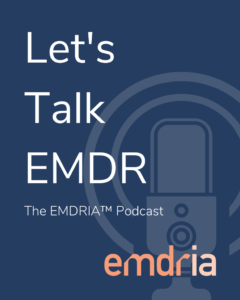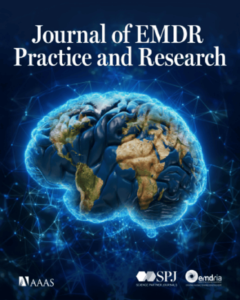A common denominator: PTSD, rapid eye movements, and fear extinction (Proceedings of the National Academy of Sciences of the United States of America)
Our findings provide evidence linking gaze reinstatement and pattern completion and advance a functional role for EMs in memory retrieval.
Read MoreA qualitative study of therapists’ use of empirically supported techniques for PTSD (Frontiers in Psychiatry)
This study aims to contribute to the understanding of how practicing therapists implement and perceive PTSD treatments by exploring the experiences and attitudes of therapists who treat PTSD in clinical practice.
Read MoreIn the News: August 1, 2025
EMDRIA members and EMDR therapy are featured in various articles and interviews. Learn more in this edition of In the News.
Read MoreUntangling the Myths: EMDR Therapy in the Perinatal & Postpartum Journey
This podcast dives into misconceptions surrounding EMDR therapy during perinatal and postpartum periods with guest Bethan Warren, LCSW, MPH-C.
Read MoreThe role of dissociation in surviving severe, systemic bullying: A reflective narrative for EMDR therapists (and trauma-responsive clinicians serving LGBTQ+ folx) (Delaware Journal of Public Health)
This article will focus on how repetitive, systemic bullying often leads to complex trauma and dissociative experiences for survival, and how an integrative, culturally responsible therapeutic approach is necessary for EMDR trained therapists.
Read MoreUsing EMDR with BIPOC Clients: Six Strategies for Children, Adolescents, and Adults
EMDRIA member Dr. Jenay Garrett shares six strategies for using EMDR with BIPOC clients
Read MoreA qualitative study understanding the effects of eye movement desensitization and reprocessing in equine therapy (People and Animals: The International Journal of Research and Practice)
This qualitative descriptive study investigates the efficacy of EquiLateral™, an equine-assisted EMDR protocol, in treating PTSD.
Read MoreHolding Space for Yourself: Trauma Stewardship in EMDR Practice
Dr. Danielle Hiestand, EMDRIA member, discusses EMDR therapist self-care through the lens of trauma stewardship.
Read MoreThe Flash Technique as an Effective Low-Intensity Intervention for Migrants at the U.S. Point of Entry (Journal of EMDR Practice and Research)
This study explores the EMDR therapy Flash Technique (FT) as a one-time intervention for newly arrived migrants.
Read MoreEMDR drumming protocol and processes: Embedding expressive arts into EMDR for work with adolescents (International Journal of the Whole Child)
This article explores a proposed EMDR Drumming Protocol and therapeutic process for at-risk youth.
Read MoreTranscranial photobiomodulation as an adjunctive therapy for persistent anxiety and depression in patients undergoing psychotherapy, EMDR, and/or SSRI treatment: A case series (EXPLORE: The Journal of Science and Healing)
Study evaluates the potential therapeutic effect of transcranial photobiomodulation (TPBM) as an adjunctive intervention for anxiety and depression despite receiving psychotherapy, EMDR, and taking SSRIs.
Read More






